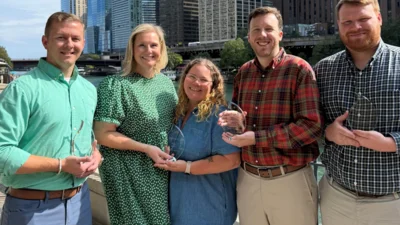Addiction impacts all areas of life. It contributes to public health challenges, mental illness, crime, and family and societal breakdown. Despite changing attitudes, the problem of addiction is still often perceived as a shameful flaw rather than the chronic illness it is. It’s the job of an addictions specialist to look beyond this prejudice and help clients rebuild their lives in recovery through various types of counseling services.
With more than 20 years of experience working in the mental health and addictions counseling field, Dr. Shelley Reed has worked with clients across various settings, including different types of counseling groups, hospitals, courts and prison systems.
As an assistant professor, clinical director and coordinator for the addictions counseling graduate certificate at Troy University, Dr. Reed now helps counseling and psychology students develop their skills in diagnosing and treating addictions.
What Is Addiction?
According to Dr. Reed, addiction is typically defined as a compulsive and difficult to control use of a substance such as drugs or alcohol that negatively impacts the ability of the individual to function.
Dr. Reed was initially drawn to the field of addiction counseling by a general interest in human behavior.
“My interest in human behavior turned into an interest in counseling,” says Dr. Reed. “I figured if I could understand the ‘whys,’ then I could work out how to help.”
Dr. Reed soon discovered that addiction was often a more complex issue that carried with it other serious challenges beyond the addiction itself.
“When clients with addiction came along, it really intrigued me because it was common to have co-occurring mental health and substance use issues,” says Dr. Reed.
Highlighting the prevalence of addiction, she describes addiction as an “equal opportunities” problem.
“I’ve never met anyone who didn’t have some form of addiction in their family,” says Dr. Reed.
According to Dr. Reed, many counselors have personal or family experiences that contribute to their desire to go into the counseling profession.
“Many of the students in this certificate program have had the experience of addiction personally, either themselves or with their family,” says Dr. Reed. “It’s very common to want to understand themselves or their family members. They also want to give back to help prevent it from happening to other people.”
Models of Addiction
Dr. Reed explains that many different contributory factors can lead to addiction.
“There’s a lot of debate in psychology regarding the nature versus nurture aspect of addiction,” says Dr. Reed. “Are you born with a predetermined risk of addiction, or is it a result of your environment or experience? There are genetic components of addiction. It’s been strongly shown, particularly with alcoholism, that there is a big hereditary component.”
This doesn’t mean that addiction is automatically passed down through the generations.
“It doesn’t make you want to misuse drugs or alcohol from the get-go,” says Dr. Reed. “But it can contribute to becoming physically dependent on the substance, whereas others might use it socially or recreationally, go about their business and not necessarily become physically addicted.”
Breaking the Cycle of Addiction
The desire to break the cycle of addiction in the community is a common trait among many of Dr. Reed’s students.
Dr. Tammy W. Montgomery graduated from TROY’s counseling and psychology master’s program with a certificate in substance addiction in 2017 before studying for her Ph.D. and becoming a licensed counselor in the greater Columbus area.
Dr. Montgomery developed an interest in addiction counseling while working as an elementary educator.
“I taught in public school as an elementary educator for 15 years,” says Dr. Montgomery. “During my time as an elementary educator, I witnessed several families needing mental health awareness and support. I also saw substance addiction and other impulsive behaviors as major factors that seemed to keep them in debilitating cycles.”
Dr. Montgomery found herself spending significant time providing resources to meet her students’ basic needs before learning could take place.
“Although I helped my students gain success academically and personally, I burned out and felt ineffective,” says Dr. Montgomery. “I was essentially working in two roles. First, I was an educator — a role in which I was highly trained and skilled. But I also took on the role as a counselor without proper skills and tools.”
She agrees that addiction and mental health go hand in hand. “I believe it is vital for every incoming counselor to learn about substance addiction or abuse and its impact on a person’s mental health and social well-being,” she says. “Understanding the unhealthy correlation between these factors might be the very ingredient needed to help a client reach and maintain stability.”
What Is an Addictive Personality?
Dr. Reed explains that it is important to understand the psychology of addiction because addicts often substitute one problem for another.
“People do substitute one addiction for another,” says Dr. Reed. “They quit using alcohol and start using cocaine or vice versa. This is why the treatment of addictions like the Alcoholics Anonymous 12-Step program tells you to abstain from all substance use.”
The experience of co-occurring disorders is commonly seen in Dr. Montgomery’s practice.
“Many of my clients experience co-occurring disorders, mental illness and substance addiction or substance abuse,” says Dr. Montgomery. “As an addiction specialist, I am always educating clients on how using substances will negatively impact their mental health and wellness. For example, for clients who smoke marijuana and experience anxiety, I usually share how the drug imposes positive and negative effects.”
However, not all addiction counselors prescribe a zero-tolerance approach, and treatment strategies often need to be more nuanced.
“I use an eclectic approach to therapy,” explains Dr. Montgomery. “Although my theoretical orientation is cognitive-behavioral therapy, I tend to incorporate techniques from mindfulness therapy, trauma-focused CBT [Cognitive Behavioral Therapy], and dialectical behavioral therapy, to name a few.”
The Changing Face of Addiction
Dr. Reed explains that addiction has always been a problem in society.
“You could probably go back to any decade or century and see a particular epidemic of addiction at that point,” she says. “Right now, synthetic opiates are the most visible problem. Fentanyl terrifies me — it’s just so dangerous. But I can remember when I was studying, it was heroin, cocaine and crack cocaine.”
Dr. Reed believes that widespread media coverage of the opiate crisis in the United States may have reduced some of the stigma related to addiction. However, she is also quick to highlight another recent event that has contributed to the problem of addiction.
“The pandemic didn’t help,” she says. “It contributed to isolation, loneliness, financial worries and health worries, all of which can increase the use of alcohol and drugs. Perhaps someone was trying to get better and begin their recovery. The pandemic certainly may have contributed to their not being able to continue that recovery.”
When Dr. Reed considers the question, “What does addiction mean?” she primarily talks about substance-use disorders. However, she also points out that behavioral disorders can also be addictive.
“We use the Diagnostic and Statistical Manual [DSM] to identify all the substances and criteria to meet the diagnosis of addiction,” says Dr. Reed. “But they also list a behavioral disorder in the DSM, which is the gambling disorder.”
Dr. Reed explains that research is being carried out to determine if other behavioral disorders should be included in the DSM.
“Behavioral addictions absolutely need to be considered,” says Dr. Reed, “whether that’s gaming or internet, sexual behaviors or compulsive buying. There’s additional research ongoing to see if they can be included in future diagnostic manuals, but currently, they’re not.”
Both Drs. Reed and Montgomery are particularly concerned about addiction’s impact on young lives.
“My clients come with diverse needs,” says Dr. Montgomery. “Some widespread areas that require constant focus include childhood trauma, depression, suicidal thoughts or behavior and unhealthy communication.”
Reducing the Stigma of Mental Health and Addiction
Dr. Reed is an advocate of improving the general public’s understanding of addiction and reducing the stigma commonly associated with the illness.
“I’m a strong believer in: The more we know, the better we can do,” says Dr. Reed. “I’m also the president of our local affiliate of the National Alliance on Mental Illness. One of our big imperatives is to reduce stigma. Because if we can reduce stigma, we can reduce some of the barriers associated with seeking treatment. I think that strongly applies to substance use as well.”
Promoting awareness around mental health is also essential for counselors who must develop strategies for looking after their own well-being while performing a difficult job.
“Self-care is so important,” says Dr. Reed. “Being able to take care of your own mental health so that you can take care of others is vital. It’s like the safety talk on an airplane. You put your mask on first before you put on someone else’s mask. With addiction specifically, it can be frustrating if you’ve worked with a client for a long time and there’s a relapse.”
According to Dr. Reed, relapse is often part of the journey to recovery.
“We can be disappointed, blame ourselves, or think we just didn’t do enough,” she says. “So we’ve got to be careful and understand it’s part of the journey. We just have to get back to it and regain that stability and continue to help with the recovery.”
Dr. Montgomery amplifies Dr. Reed’s advice.
“Don’t be afraid to seek therapy for yourself and engage in self-care consistently,” advises Dr. Montgomery. “Plan to become a lifelong learner. This profession is always changing and growing, and it requires each of us to continue educating ourselves to remain effective practitioners.”
How To Get a Counseling Certificate
According to Dr. Reed, there are typically two ways a student can obtain an addictions counseling certificate from TROY.
“They can be working on the certificate while they’re also getting their graduate degree in either clinical mental health counseling or rehabilitation counseling,” says Dr. Reed. “Or they can come back and get it post-master’s.”
She explains that the certificate program consists of three term-long courses. In addition, students are also required to complete two internships.
“If you’re a current clinical mental health counseling student, these three courses can count as your electives required as part of your clinical degree,” says Dr. Reed. “Then, if you do the internship at an approved site, those internships can count toward the clinical degree and addiction certificate. So really, there is no extra coursework, just specialized coursework.”
Online Counseling Certificate Programs
The TROY counseling certificate programs are available online, making classes more accessible for adult learners.
“Most of our students are working, have families and are doing this in the evenings online,” says Dr. Reed. “Many of them are already working in the field in some capacity. Maybe they are case managers or administrative assistants and want to progress in their careers.” (While the coursework is entirely online, the two required internships that are part of the program require weekly in-person classes.)
The program is also popular with retired military personnel and their spouses.
“There’s a correlation between PTSD (Post Traumatic Stress Syndrome) and substance use,” says Dr. Reed. “PTSD can be common for veterans. A lot of individuals start using drugs to self-medicate for whatever reason that may be. So, absolutely, it can be a concern among veterans and those who have retired or have been discharged.”
Where Do Addiction Counselors Work?
Dr. Reed explains that addiction counselors are employed in a variety of settings.
“It varies greatly,” says Dr. Reed. “Many counselors find themselves working in community agencies that have residential programs, inpatient programs, day treatment programs and outpatient programs. You’ll also find them working in crisis intervention, mostly in hospitals but also in the criminal justice system.”
As demonstrated by Dr. Montgomery, there are also opportunities to follow an extremely rewarding career in private practice.
“I enjoy helping people re-narrate their stories,” says Montgomery, “helping clients to challenge their negative thinking by reframing them, incorporating new perspectives on addressing their issues and managing unwanted moods.”
According to the U.S. Bureau of Labor Statistics, employment opportunities for substance abuse, behavioral disorder and mental health counselors are set to grow by 23% through 2030, requiring an additional 75,100 qualified counselors across the United States.
Why TROY?
As a graduate of TROY herself, Dr. Reed is quick to highlight the quality of her experience studying at the University.
“Most of our faculty here at TROY within the counseling division are currently or have long worked in the field,” she says. “I think that extra expertise and experience makes the information more real and demonstrates to our students how they can apply what they learn in real-world settings. I think that really helps us stand out.”
Dr. Montgomery echoes the positive experience. As well as providing the skills and tools to make a career transition from educator or counselor, Dr. Montgomery cites the certificate program at TROY as a time of significant career skills development.
“I am so glad I chose TROY,” she says. “It was a wonderful experience. It was where my leadership skills were enhanced and amplified.”
An addictions counseling certificate from TROY can help clinical mental health and rehabilitation professionals expand their careers and help clients with informed diagnosis and treatment plans. To learn more about how you can help clients with addictions “re-narrate” their life stories, visit the counseling certificates program page on our website.
Original source can be found here.






 Alerts Sign-up
Alerts Sign-up